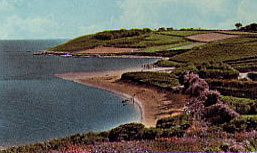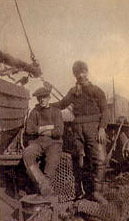|

 | |  | |
The following are memories recalled by Melba Lucas, as recorded by Hanover Housing Association in their book 'Tale of the Century' published in 1999.
 Summers were hot and the days seemed to drift into eternity. The sky rivalled the sea for blueness and the ocean was transparent far from shore. The sand was hot and silky and the sea sparkled like crystal glass in the sunshine. Scilly was a dream world for a child. Summers were hot and the days seemed to drift into eternity. The sky rivalled the sea for blueness and the ocean was transparent far from shore. The sand was hot and silky and the sea sparkled like crystal glass in the sunshine. Scilly was a dream world for a child.
My day would start when the sun was up and I would leap out of bed and get straight into my swim things. Then downstairs for a slice of bread and jam and a quick cup of water (I drank nothing else except cream at my Auntie's) and off out the door down to the beach for the day with my friends.
We liked to make footprints in the wet sand and then go for a swim off the end of the old quay. Harold Saundry lived on a yacht moored up to the quay and sometimes he would lend one of his five punts to us kids.
On Saturday I would have a good wash and put on a dress and go to stand by the church before 8.30am when Mr. Jimmy Mitchell would arrive with his pony and trap delivering the milk. I would then ride over with him to my Gandfer and Aunt Annie's farm.
If I missed Mr. Mitchell, I would ride over with Mr. Israel Pender on his donkey and cart. He used to sweep the roads and keep the back lanes free of weeds.
When I arrived at the farm I had some jobs to do. Sometimes it was putting the milk through a separator: I would wind a handle and cream would come out one pipe and milk out another. Then I would put the cream in a churn and wind it round and round until it turned to butter. The separated milk would go to the pigs in the back garden. I loved to help get the cows down to the shed for milking. When my jobs were done I was free to go down to the beach.
Aunt Annie had fantastic food. There was always cream, syrup, fruit tart, freshly baked sheath cake or potato cake. It still makes my mouth water when I think of Aunt Annie's table.
Saturday evenings were fun. I was scrubbed clean and dressed up and off we went in Uncle's bone shaker of a lorry to town. The shops would stay open until nine on Saturday night and a silver band would play. Aunt Annie would give me four pennies and I would get a penny lucky bag, a pennyworth of gob stoppers and go to the cinema with the other two.
Then back home for cocoa. Granfer wore a flannelette night-shirt reaching down to his feet, which made me laugh. He would tell wonderful, stories about wrecks and about the time when 'Schiller' went aground and he helped bring bodies from the beach in a horse and cart.
Then came Sunday. The old town consisted of 14 granite houses and each had a boat of some sort. The women would pack Maun baskets with pasties, cakes, sandwiches, kettles, saucepans, water and milk and we would load it on the boats. Then the flotilla of boats, carrying old and young (plus some dogs), would make for either Ganilly, Tean of Samson.
The men would go shrimping, the children went winkling and the women collected bits of wood and dry seaweed to build a fireplace on the rocks ready to boil the water for tea and to cook the shrimps and winkles. We would leave when the moon was shining and sang all the way home.
During the summer an old tramp came across on holiday. He sat on a barrel at Poynters Slip playing a Zither. He called it his fairy bells and people would give him money. Sometimes we would have terrible gales and the waves crashing into the shore could be six or eight feet high.
One summer we had a really high tide and the water came up into the street. It was fun punting down the street, but it took two days to clear up the mess.
 As summer drew to a close, the men would work on their boats. The coal boat would arrive and my father would get on his coaling clothes and help unload the coal from the hold. It was shovelled into buckets, then the winch took it to the quay and emptied it on to the horse-drawn cart. As summer drew to a close, the men would work on their boats. The coal boat would arrive and my father would get on his coaling clothes and help unload the coal from the hold. It was shovelled into buckets, then the winch took it to the quay and emptied it on to the horse-drawn cart.
There was always lots dropped on the beach, so after school the poor kids would gather the loose coal and mums would come down with an old pram and wheel it home.
My only sadness was that I had a pig of a father who got drunk and beat my mother and gave her so little money that she had to wash clothes to feed us. She would be crying from fatigue, standing over the bath of washing and then my father would come home drunk and usually beat her.
Sometimes there was nothing to eat in the cupboard but our neighbour, Aunt Jess would always come to the rescue and give me a bowl of porridge with brown sugar and cream before I went to school.
Scilly was a dream world for a child. It is still a close knit community and I am a true islander as I have lived all my life here and my ancestors have lived here for over 300 years.
| |  | |  |
To add a comment you must first login or join for free, up in the top left corner.
|
|


